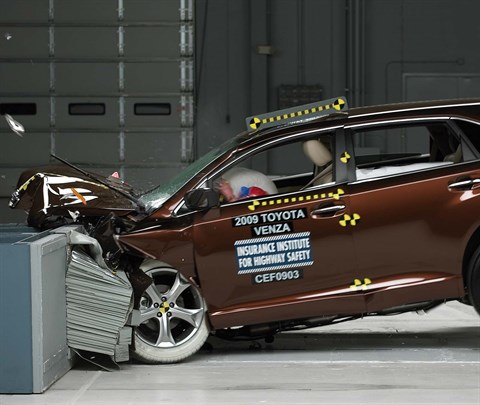Moderate overlap front: original test
Rating applies to 2009-15 models
Tested vehicle: 2009 Toyota Venza 4-door 4wd
The Toyota Venza was introduced in the 2009 model year.
| Evaluation criteria | Rating |
|---|---|
| Overall evaluation | |
| Structure and safety cage | |
| Driver injury measures | |
| Head/neck | |
| Chest | |
| Leg/foot, left | |
| Leg/foot, right | |
| Driver restraints and dummy kinematics | |

Action shot taken during the frontal offset crash test.

The dummy's position in relation to the steering wheel and instrument panel after the crash test indicates that the driver's survival space was maintained very well.

A high head acceleration occurred when the dummy's head hit the steering wheel through the airbag.

Intrusion into the driver's space was minimal, and all leg and foot injury measures were low.
Side: original test
Rating applies to 2013-15 models
Tested vehicle: 2013 Toyota Venza 4-door 4wd with standard front and rear head curtain airbags and standard front seat-mounted torso airbags
The Toyota Venza was introduced in the 2009 model year. Beginning with 2013 models, design changes were made to the rear door trim panels to improve occupant protection in side impact crashes.
Two tests of the Venza were conducted, one of a 2009 model by the Institute and the other representing a 2013 model by Toyota. These vehicles are rated separately, except that the structure ratings for both vehicles are based on both tests, as are driver dummy injury and head protection ratings, because no changes were made affecting front seat occupants. (The car tested by Toyota was designated as a 2011 model but included the rear door trim changes of the 2013 models.)
| Evaluation criteria | Rating |
|---|---|
| Overall evaluation | |
| Structure and safety cage | |
| Driver injury measures | |
| Head/neck | |
| Torso | |
| Pelvis/leg | |
| Driver head protection | |
| Rear passenger injury measures | |
| Head/neck | |
| Torso | |
| Pelvis/leg | |
| Rear passenger head protection | |
Roof strength
Rating applies to 2009-15 models
Tested vehicle: 2010 Toyota Venza 4-door 4wd
| Overall evaluation | |
|---|---|
| Curb weight | 4,037 lbs |
| Peak force | 18,977 lbs |
| Strength-to-weight ratio | 4.70 |
Head restraints & seats
Seat type: Power seats (AHR)
| Overall evaluation | |
|---|---|
| Dynamic rating | |
| Seat/head restraint geometry |
About the head restraint & seat test
Currently, IIHS tests apply only to front seats.
